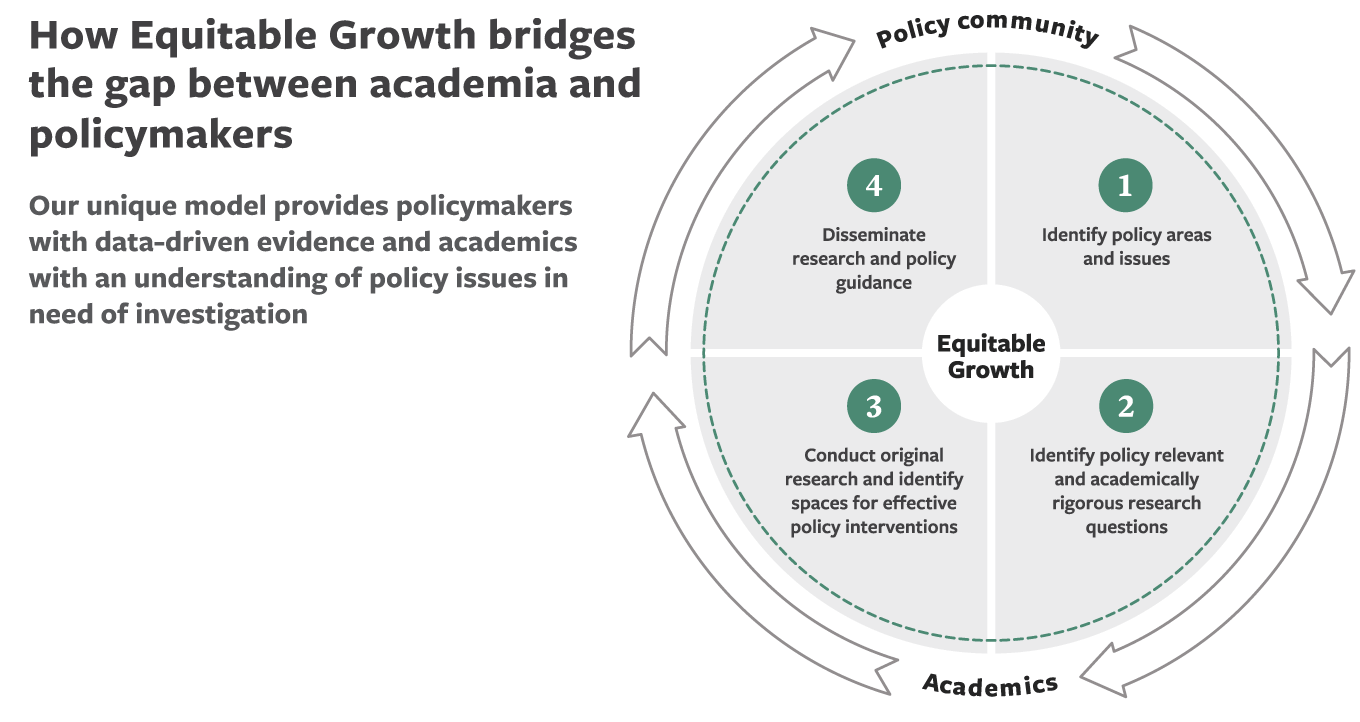Lessons from research funded by our academic grant program and new lines of inquiry
Overview
The Washington Center for Equitable Growth is a nonprofit research and grantmaking organization dedicated to advancing evidence-backed ideas and policies that promote strong, stable, and broad-based economic growth. Our grant program, now entering its seventh year, is critical to this mission. By supporting scholarly research, Equitable Growth seeks to deepen our understanding of whether and how inequality affects economic growth and stability.
Download File
Inequality and economic growth
Our academic grant program includes a portfolio of cutting-edge scholarly research investigating the various channels through which economic inequality may or may not impact economic growth and stability, both directly and indirectly. We have provided grants to more than 200 researchers, beginning in 2014. In total, Equitable Growth has distributed more than $5.6 million in grants. In 2019, we announced $1.064 million divided among 14 grants to 33 researchers and 13 grants to doctoral student researchers.
This research does not sit on a shelf. Equitable Growth bridges the gap between academia and policy by fostering research that is relevant to today’s policy debates, and by informing policymakers of cutting-edge research. Our in-house team of nearly 40 staff then focuses on making the research findings relevant to the policymaking community. We engage policymakers on specific issues that flow from our research interests: how to measure economic growth and well-being, taxing capital, how to ensure competition in the market, how to raise wages, and how to ensure family economic security. We also engage policymakers by asking them what research questions they need answered, so that academic research can be relevant and actionable. (See Figure 1.)
Figure 1

Equitable Growth focuses on questions about the role of economic inequality in the functioning of the economy, and we support inquiry using many kinds of evidence, relying on a variety of methodological approaches and cutting across academic disciplines. We have a keen interest in measurement and data collection, and tend to fund research using empirical techniques that can show causality. We also are interested in supporting efforts to increase diversity in the economics profession and across the social sciences because we recognize the importance of diverse perspectives in broadening and deepening the research on inequality and growth.
Our Steering Committee, made up of former top policymakers and leading academics, guides our research priorities, helps write our annual Request for Proposals, and reviews and approves funding decisions. Its members are:
- Former White House Domestic Policy Council Director Melody Barnes
- Princeton University economist and former Vice Chairman of the Board of Governors of the Federal Reserve System Alan Blinder
- Equitable Growth President and CEO Heather Boushey
- Princeton University economist Janet Currie
- Harvard University economist Karen Dynan
- Harvard University faculty member and former White House Council of Economic Advisers Chair Jason Furman
- Former White House Chief of Staff and Co-founder of Equitable Growth John Podesta
- John Bates Clark Medal winner and University of California, Berkeley economist Emmanuel Saez
- Nobel Laureate and Massachusetts Institute of Technology economist Robert Solow
- University of California, Berkeley economist and former Chair of the White House Council of Economic Advisers and Director of the White House National Economic Council Laura Tyson
- Former Federal Reserve Chair and Chair of the Council of Economic Advisers Janet Yellen
Equitable Growth supports research in four core areas that we think are particularly important for understanding the relationship between inequality, growth, and well-being:
- Macroeconomic policy
- Market structure
- The labor market
- Human capital and well-being
These categories evolved somewhat over time. Early on, we focused on the roles played by individual and institutional actors and how they contributed to or were affected by the sources of economic inequality. Research findings suggested that there were also notable structural barriers standing in the way of strong, stable, and broad-based economic growth, so our questions evolved to include a greater focus on structural issues.
Our earlier focus on entrepreneurship, for example, shifted as we came to see it as deeply affected by the larger issues of human capital development and market structure, as well as macroeconomic issues such as access to credit. So now, we examine the issue of encouraging innovation under the larger issue of market structure. To be clear, we always ask questions about large forces in the economy, and we still ask questions at the micro level.
What follows is a description of our four funding channels, how they evolved, and examples of emblematic research in each category that demonstrate how we seek to achieve our mission of developing and supporting evidence-based ideas for achieving strong, stable, and broad-based economic growth. Readers will probably note that some grants could fall into more than one category. We value research that has implications for a number of questions and issues.
Related
2020 Request for Proposals
Explore the Equitable Growth network of experts around the country and get answers to today's most pressing questions!







